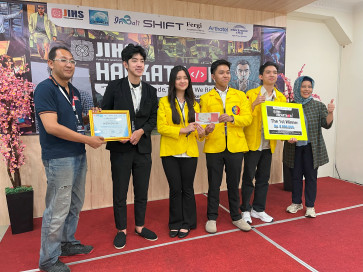Time for nation to include the 'marginalized'
Indonesia's anniversary of independence is always considered a cause for celebration, but suchfestivities have a sour taste for those groups in society whom sociologists call "marginalized", whether because of their socioeconomic status, political aspirations, religious beliefs or sexual orientation
Change text size
Gift Premium Articles
to Anyone

Indonesia's anniversary of independence is always considered a cause for celebration, but suchfestivities have a sour taste for those groups in society whom sociologists call "marginalized", whether because of their socioeconomic status, political aspirations, religious beliefs or sexual orientation. The following reports aim to depict the lingering problems facing marginalized groups -- problems that need to be resolved before they threaten Indonesia's pluralism.
"Ask not what your country can do for you. Ask what you can do for your country." The evergreen words of former U.S. president John F. Kennedy have inspired leaders around the world to promote nationalism.
But there are several groups of people here who cannot do anything for their country, no matter how willing they are. Quite often the government, too, in making policies, listens only to certain groups of people and rarely involves the others.
Worse, the voices of some have been not only left unheard, but abandoned or even repressed, despite the independence Indonesia gained 63 years ago.
These are the people who have never been involved in the process of the country's development, a situation that University of Indonesia sociologist Imam Prasodjo describes as "marginalization".
Who are the "marginalized" in this archipelago of 230 million people?
Different experts come up with different answers.
Imam counts the urban poor, rural people, isolated tribes, fishermen and educators among the marginalized groups in the community.
The Dayak tribe in the jungle of Kalimantan, says Imam, is an example of those "extremely" marginalized as they have no access to the changes taking place in the country.
"The Dayak tribe was never involved in the government's creation of forest concession plans, and suddenly they see bulldozers, protected by armed guards, cutting down trees in the jungle, the same trees that they, customarily, have to guard," said Imam.
"The same with teachers, who have views, hopes and dreams, but have no channel to voice their wishes. Even if (the government) raised their salaries, they're still academically marginalized because they're never involved in the formulation of the national education system and are made the object of all educational policies."
The marginalization, he said, is a result of the top-down, centralistic kind of government that began in the late era of Indonesia's founding president Sukarno and that crystallized and was systemized during the New Order regime.
The reform era has actually brought a glimmer of hope that the top-down style may be dismantled but, Imam said, this needed a more participatory approach to development, involving all members of society in policy making -- especially those who will be most affected by the policies.
To economist H.S. Dillon, all poor people are marginalized. He said wealth was concentrated in a minority -- those who were close to the ruling class.
Dillon, also an agriculture observer, paid special attention to farmers, who, he said, had contributed a lot to the country, but received the least.
"According to 2005 data, every year the country siphons funds worth Rp 29 trillion (US$3.16 billion) from rural areas (the agriculture sector). But what's given back to them is no more than Rp 9 trillion," he said.
Dillon said although politically Indonesia was an independent country, economically it was still colonized -- not by the Dutch but by the ruling elite.
"This situation is very dangerous for our nation. We are one of the few democratic states in the world, but this lack of leadership -- this poor leadership and poor governance -- can make people give up any hope for democracy," he said.
Islamic scholar Syafii Maarif pointed to discrimination, which, he said, remained unresolved in Indonesia after 63 years of independence.
"Since the declaration of independence, there has been no administration that is really in favor of minority groups," he said.
"Everybody has the right to live here, even atheists. No one should impose restrictions on them. And even though we have had no explicit agenda to abolish minority groups, it is the public who disgraces them."
On the other hand, he said, the groups had positioned themselves as exclusive. He cited the Ahmadiyah group, which refused to perform prayers with the followers of mainstream Islam.
"It is the groups themselves that have drawn the 'borderlines', and I frankly disagree with their exclusivity."
Historian Asvi Warman Adam criticized the government for maintaining discriminatory treatment against ex-communists and their families. He said not all people stigmatized as "ex-communists" had actually been involved in communist activities, but the term tended to be generalized.
He cited regulations in several areas under which senior citizens alleged to have had a connection with the Indonesian Communist Party (PKI) are not allowed to apply for lifetime identity cards.
He also talked about former political prisoners exiled to Buru Island by the New Order regime for alleged links to the PKI who should have received compensation from the government.
"There were about 10,000 people cast out to the island without going through any legal process, and they were trapped in forced labor. The government should admit this past mistake and compensate the victims, either by financial compensation or by rehabilitation of their good names."
Historian Rushdy Hoesein takes a different view, saying the ex-communists and their offspring had positioned themselves as "outsiders".
He added some of the people were "nurturing their hostility" toward the state, and even intended to take revenge.
"The PKI was basically identical to a force fighting against authoritarianism, like the one during the New Order era. And now that they still endure stigmatization, their suppressed feelings are wreathed in vengeful intentions," he said.
"They should get over such feelings because the government itself no longer discriminates against them. They should have been striving for their own improvement and contributing to the development of the country."
The debate about "marginalized" groups may lead nowhere, but such groups do exist and they are an inseparable part of this country.
A slight change to Kennedy's words may be necessary to shift the old paradigm: "Ask not what people can do for the state. Ask what the state can do for the marginalized people."









